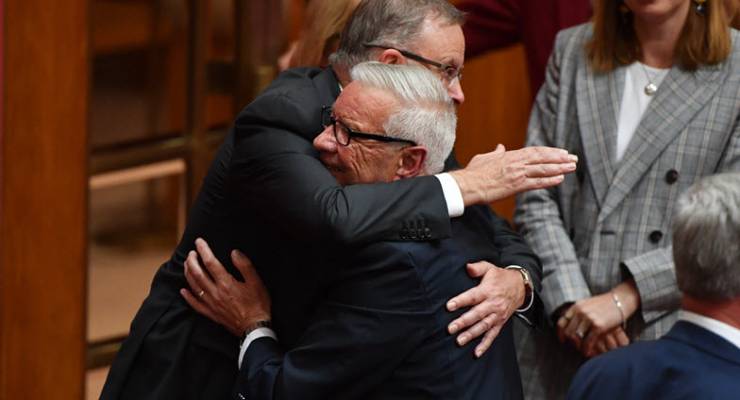
If you followed politics, you knew of Doug Cameron, then-head of the AMWU, back in the 1990s. And for those of us who came of age in the Hawke-Keating years, he seemed like a dinosaur. He was a hard left-winger, an ardent advocate of protectionism, a man indelibly shaped by the post-war Scottish steel town he grew up in, who “joined the union on my first day at work” as he put it in his valedictory speech this week. He moved to Australia in the early 1970s and worked, at first, at the Pagewood car plant (around the corner from where I grew up), before taking a job at the Liddell power station, which led to his ascent within the AMWU.
How different from what we’d been given by federal Labor since 1983. Cameron was entirely at odds with the economic reform led by the urbane Paul Keating — the abandonment of protectionism, the embrace of a global economy that would accelerate Australia’s decline as a manufacturing nation, the reform of industrial relations to move to enterprise-level agreements rather than industry or even national wage-fixing. “A union is only as strong as its weakest shop and we would use the strength of our ‘hot shops’, the well organised sites, to raise standards across the industry,” Cameron said in his valedictory. “Pattern bargaining, as it was known, is the most effective way for working people to get decent pay and conditions.”
People like Cameron seemed to me to be mere impediments to the natural arc of economic history toward free markets and economic individualism, the last of the stereotypical British-born union officials who could be found leading wildcat strikes in the 1970s (“demarcation, bruvvers!”). Even Labor seemed to understand that times had changed. “Doug needs to come into the 21st century,” Kevin Rudd once said about him, before he entered the Senate in 2008.
Now, all these years later, Cameron is, if not entirely vindicated by history, then shown to be far more right than neoliberal types like me would have suspected at the time.
Because, as it turns out, Australia needs active trade unions operating beyond the enterprise level to drive wages growth. It needs pattern bargaining and industry-wide bargaining to rescue workers from the wage stagnation that is the result of an industrial relations system tilted in favour of employers. It needs active — dare one say militant — unions and leaders prepared to fight for their members. And the privatisations against which Cameron railed for so long seldom delivered the kinds of benefits advocates (like me) insisted they did. Instead, Cameron was in tune with the electorate — voters, no matter which party they voted for, have long hated privatisations and believed they only benefited corporations, and certainly not the community that had to pay more for poorer services.
I still think Cameron is wrong on trade and protectionism, but in his opposition to it he grasped something that blithe neoliberals like me — tertiary-educated people who would never need a manufacturing job — missed: that the hollowing-out of manufacturing had social and political consequences for communities that weren’t addressed by “transition” and “adjustment” packages, that such communities felt left behind. “We know that material prosperity has not brought increased satisfaction with life and that communities and families continue to feel exposed and isolated,” he said in a major speech in 2011 on “the good society”. And he understood the connection between this and broader progressive policies.
It has long been my view that, for example, orthodox free trade policy, and neo-liberal economic orthodoxy in general alienates Labor’s base. This alienation leaves little room for progressive social policy and very little forgiveness for hard, but essential reforms like pricing carbon emissions. Nowhere is this clearer than on trade policy. I get emails every week from working people who tell me that having seen free trade policies destroy manufacturing jobs, they are not about to support a carbon tax.
He was talking about Labor at the time, but Labor’s problems became the Coalition’s as the neoliberal project began to fall apart across the West in 2015 and 2016. Here, the party of Australian neoliberalism found itself having to embrace manufacturing protectionism, economic interventionism and re-regulation to head off a resurgent Labor that had embraced all three ahead of their opponents. “Under Bill’s leadership, the Labor Party again feels like the Labor Party I joined many years ago,” Cameron said on Wednesday night. “It is unashamedly progressive, pro-worker, pro-women, outward looking and confident.”
I’m not sure a parliament full of Camerons would be ideal, but time has justified many of his instincts over those of us who thought free markets and untrammelled individualism were the only future. Public life will miss him — and his distinctive call of “rrrrrabble!” across the Senate chamber — in ways few would have picked a decade ago and perhaps none but him in the 1990s.
What do you make of Doug Cameron’s time in parliament? Write to boss@crikey.com.au.








Crikey is committed to hosting lively discussions. Help us keep the conversation useful, interesting and welcoming. We aim to publish comments quickly in the interest of promoting robust conversation, but we’re a small team and we deploy filters to protect against legal risk. Occasionally your comment may be held up while we review, but we’re working as fast as we can to keep the conversation rolling.
The Crikey comment section is members-only content. Please subscribe to leave a comment.
The Crikey comment section is members-only content. Please login to leave a comment.